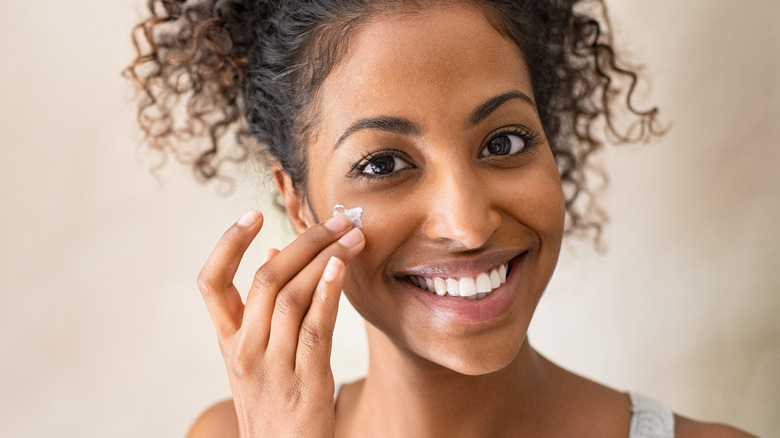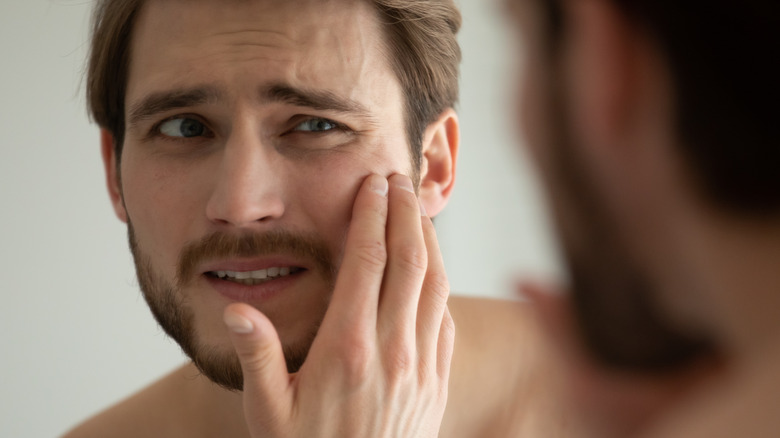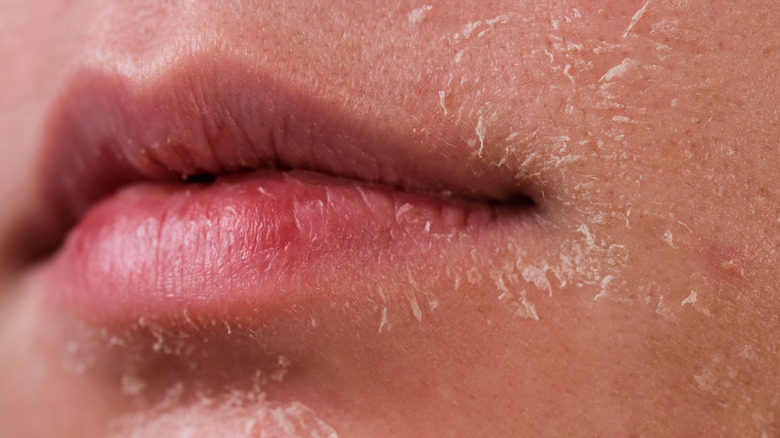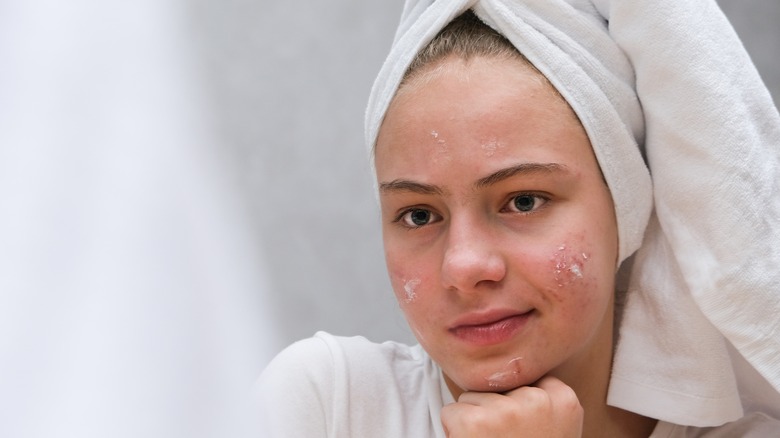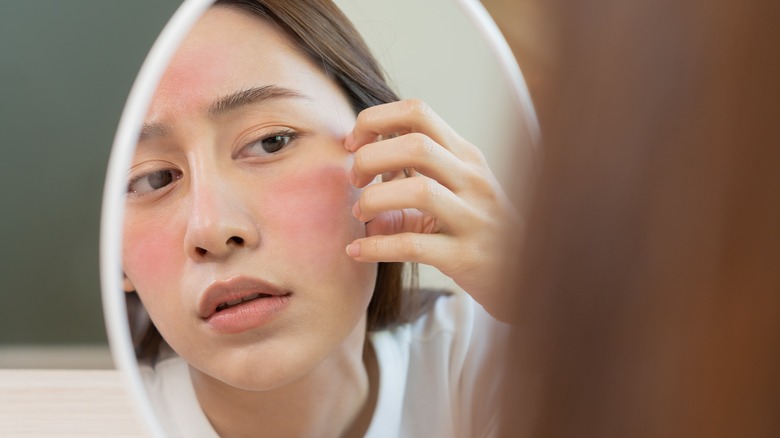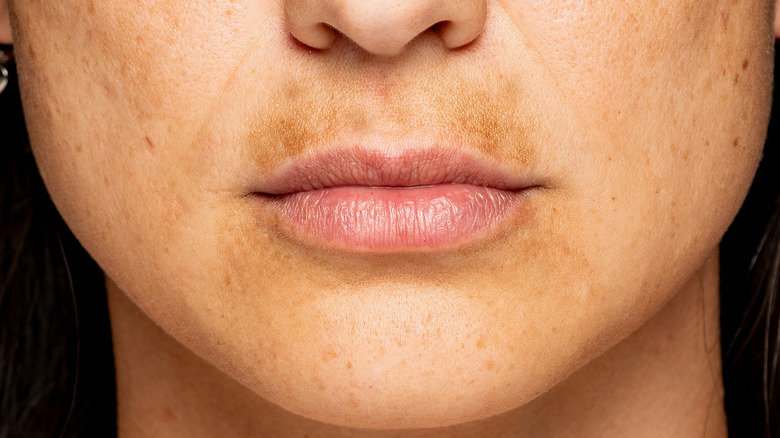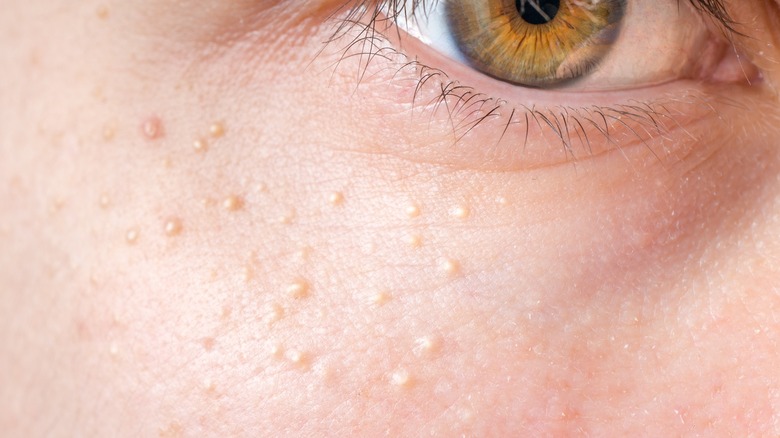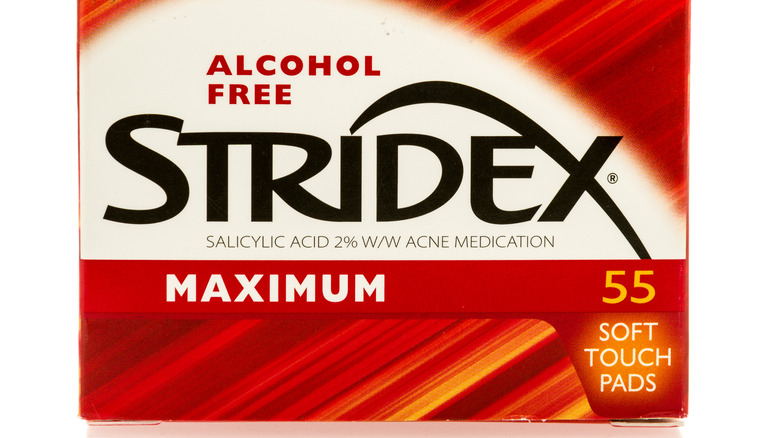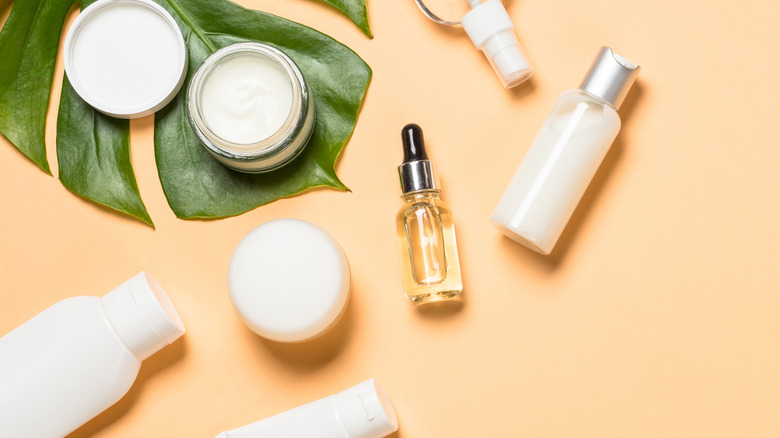Signs You Need To Change Your Skincare Routine
Whether you are a skin serum-slathering veteran or a total rookie when it comes to skincare and skincare products, there is always something to learn. This is especially true if your skin is starting to show signs of discomfort or simply not responding well to your tried-and-true regimen. There are a ton of reasons why you might need to update your skincare routine, even though just thinking of this is enough to send many of us into a total anxiety spiral. Unfortunately, some products lose their oomph over time, and your skin may even decide to build up a tolerance to others (via Well+Good).
Where does one even start when trying to revamp a skincare routine that has been dialed in for years? Not to mention that the cost of embarking on such a journey is prohibitive in itself. That's why we did some of the dirty work for you. We dove into how to interpret many of the signs that your skin sends you, and more importantly, how to rectify them. Hopefully, this can help you nail down a skincare routine that suits your needs without breaking the bank or (gasp) causing further issues.
You go to bed with your makeup on
You already know that going to bed with your makeup on is a no-no. We all know this intellectually, but sometimes laziness gets the best of us as we melt into our beds after a long day. However, if failing to remove your makeup is a regular part of your routine, this is definitely a habit that needs to be promptly addressed and changed. Sleeping in your makeup can essentially expedite all of the symptoms that you're likely wanting to avoid.
First of all, sleeping with your makeup on can speed up the process of developing crow's feet and other wrinkles (via Good Housekeeping). There is nothing wrong with having these life-lines on your face, of course. However, we needn't try to encourage their emergence. This happens because the makeup on our faces can trap dirt and oil against our skin, which increases the load of oxidative stress our skin endures.
Sleeping in makeup can also increase acne if you already have it. Additionally, it can increase your risk of infection, since the skin's barrier isn't being properly cared for. You also put yourself at a heightened risk of developing a rash or dull skin if you do not remove your makeup nightly.
Your skin is too oily
It's true: Some people just produce more oil than others. Oftentimes, however, oily skin is caused by internal and external factors that we can work with, if not control. So instead of being upset that your T-zone looks like an oil slick after four hours, let's look at why our skin gets caught up in producing excess oil.
Hormone fluctuations and genetics can definitely play a role when it comes to skin oiliness (via Huda Beauty). If that's why your skin is oily, talk to a derm about your options. In other cases, though, oily skin can be caused by a skincare regimen that doesn't suit your skin. If your skin seems to be producing too much oil, your routine might be too harsh. People often get caught up in the mindset that they need to vanquish all oil from their skin to avoid the emergence of acne. In reality, the more you strip your skin of oil, the more it will produce as it tries to find its way back to homeostasis . This can often leave you with excess oil that you then try to dry out, thus perpetuating a vicious cycle.
Of course, environmental factors can also influence skin oiliness. Being in humidity, extremely cold weather, and sun damage can all play a role in this. If these factors are upping your oil factor, it is worth diving deeper into adjusting your skincare routine to suit seasonal changes.
Your skin is uncomfortably dry
On the flip side of super oily skin is extremely dry skin. You know the feeling — it's like your skin is somehow too small and stretched uncomfortably over your face. Dryness can also present as flaky patches of skin, but we'll get to that shortly.
Tight-feeling skin is actually the first sign that you might be experiencing dryness. Interestingly, this sensation of tight skin is sometimes felt after applying your moisturizer. If this is the case for you, it is time to reevaluate some of the ingredients in the products that you're using (via Women's Health).
Certain acne-fighting ingredients can exacerbate the feeling of dry skin. These are ingredients that you should avoid if you're feeling your skin getting drier. Such ingredients include retinoids, benzoyl peroxide, salicylic acid, alcohol, and some fragrances and preservatives. Many of these are touted for their acne-banishing prowess. However, they can absolutely contribute to the discomfort that dry facial skin can cause.
You have dry, flaky patches of skin
The feeling of tight skin is the precursor to more visible signs of dry skin, such as flaky patches or the appearance of cracked makeup. If you are already avoiding many of the ingredients that contribute to dryness and still noticing that your skin doesn't seem to hold moisture, it is time to take a deeper look. This is likely a result of the skin's barrier being compromised in one way or another. To rectify this, it is necessary to rebuild the integrity of this barrier, so it can better retain moisture (per Southern Living).
Utilizing mineral oil and Vaseline are two great ways to help reinforce your skin's natural barrier. These substances can help rebuild the barrier of the skin by locking moisture in. However, if you constantly find yourself needing to supplement your skincare routine with Vaseline and other similar products to combat dryness, it is worth taking a deeper look at the ingredients that you are rubbing on your face to see if you can dial in your regimen a bit more.
According to Healthline, it is also beneficial to lower your shower water's temperature, as hot water can dry out the skin. Employing a humidifier in drier environments can help moisturize your skin. Coconut oil, colloidal oatmeal, and antioxidant-rich substances have also been shown to help restore the skin's protective barrier and prevent the development of dry, flaky patches.
You are experiencing breakouts
So yeah, it does seem pretty obvious to change your skincare routine if you are experiencing breakouts. However, how many times have we been trapped in the cycle of having breakouts and overhauling our routines, only to be met with parched, rough skin a few weeks later when the drying ingredients really start to take hold? (Not sure if that is just us, but we assure you, it has happened more than once.)
Breakouts can definitely happen after you change up your skincare routine. While this can sometimes be due to a purging of the skin, that is typically not the case. If you change up your skincare product routine and find that you have a few more breakouts in the areas where you normally experience them, you are likely undergoing a purging due to increased cell turnover. If you start experiencing new breakout zones, that is more likely to be caused by a reaction to the products you are using (via Allure).
If you are experiencing a lot of breakouts and compensating by drying the life out of your skin, remember that the perfect hydration balance is key. Investing time and money into a lightweight moisturizer might be the key to your skin's success (per Huda Beauty). Of course, it may not always be so simple, which is why keeping your dermatologist on speed dial is a great idea.
Your facial skin is irritated
Experiencing facial irritation is a surefire sign that something is simply not agreeing with your skin's constitution. Irritation is most often caused by overdoing certain skincare activities, such as scrubbing with aggressive ingredients or over-exfoliating. The good news is that if these are the causes of your skin's irritation, you will likely be able to fix the problem before it spirals into more painful or unsightly redness and irritation (via Huda Beauty).
If you often exfoliate, there is a chance you could be going after it too hard. Exfoliating more often can cause abrasions on the skin's surface, thus degrading the barrier and leaving your skin more sensitive. Creating this kind of weakness on your skin's barrier leaves it more susceptible to bacteria (and breakouts that can be caused by said bacteria getting trapped). One way to discern if this is happening to your skin is to check if other products sting when you apply them. If so, you'll likely benefit from taking a break from the exfoliation station.
You have redness and other discoloration
While redness can be a sign of irritation and a signal to invest in gentler products, it can also be a sign to make a few small, non-product-related changes to your routine. One of the main ways to cut down on redness is to lower your shower temperature, as reported by Refinery 29. The heat from the water and the tendency to scrub our faces with a bit more vigor while enjoying our "me time" can lead to sensitive facial skin appearing redder than we'd prefer.
Sometimes, discoloration can be caused by age, a history of acne, and sun exposure (via Bustle). If your hyper-pigmentation is a result of these factors, vitamin C serums are known to help fade dark spots. Vitamin C serums are so powerful because they contain large amounts of skin-renewing antioxidants. They also can serve as a chemical exfoliant, which is a less abrasive way to exfoliate your skin and encourage your fresh new skin cells to shine through.
In other cases, skin discoloration can be caused by viral or fungal infections. In these instances, it is best to tackle the discoloration with some help from your dermatologist (via WebMD).
Your current routine isn't yielding results
It might seem obvious, but switching up your routine if you just aren't seeing results is crucial. After all, why spend so much money and time on products and care that isn't jibing with your skin's natural chemistry? While updating your regimen may not yield results like those we see on Instagram (uh, hello, filters), seeking out products that are known to guide your skin in the direction you desire aesthetically is a good first step.
Some products lend themselves well to providing a matte finish-style look to your skin, while others promote that coveted dewy glow that seems to be super popular right now. If you desire a certain look and your skincare products are not delivering, mix it up! Furthermore, if you are set on confronting a perceived skin issue such as acne scarring or redness, you can find products that help with those conditions as well. If tackling active acne is more in your bag at this time in your life, finding products that can banish acne while also providing plenty of hydration for your skin are key (via Insider).
You have small white bumps on your face
We tend to think of acne as small bumps and blemishes that show up as a result of clogged pores. This is definitely true of the unsightly zits that crop up in the middle of your forehead the morning of a big event, but this isn't necessarily the case for all of the other little bumps that you might find on your skin. Sometimes, using a product that isn't right for our skin can cause a skin condition called milia to pop up. Milia looks like a bunch of tiny, white pimples, but they are not caused by the same things as your standard acne (via Insider).
Milia is often spotted on newborn babies. It is typically caused by the skin's failure to regenerate its skin cells properly. This leads to the dead skin cells getting stuck beneath the surface of the fresh skin, enabling the overall development of milia (via WebMD). One of the best ways to prevent developing milia is to ensure that you are using a moisturizer that is suitable for your skin type. Using a moisturizer that is too heavy or intended for less sensitive skin is a common way to develop milia (per Insider).
You haven't changed your skincare routine since you were a teenager
Your perspective on skincare is likely a product, in large part, of the era in which you grew up. If you are a millennial and you are still grappling over whether or not to give up your nightly Stridex pad habit, the answer is NOW. In fact, you should have tossed those things to the side right after the heyday of the Spice Girls. In all seriousness, though, if you are still hanging on to the acne-fighting methods of your pubescent self, it is time to give your skincare routine a huge overhaul (via Vogue).
Your skin is different now, and it deserves to be treated with a bit more compassion than most of us could summon while we battled the woes of junior and senior high. The seasons and the pollutants that you are exposed to aren't the only factors that influence the condition of your skin — your real-world life experience does, too. As explained by Vogue, the cleanser you may have loved as a teen might not be cutting it as you expose yourself to pollutants, stress, and the other oh-so-lovely facts of life as an adult.
You are over-using certain products
Just like how over-moisturizing can lead to the development of milia, over-using other products can mess with the quality of your skin as well. This is true even if they are products that generally agree with your skin's chemistry. Ultimately, just using more products than necessary can ignite the need to reevaluate your skincare routine (per Vogue). If your skincare routine takes you the better part of an hour to complete before bedtime and only yields so-so results, it is definitely time to take a look away from the mirror, so to speak.
In many cases, using too many products can compromise the integrity and effectiveness of the stuff that your skin is really craving. If you are dead-set on having a complex, multi-step routine, at least ensure that you are using products in the right order. Furthermore, if you are convinced that you need to utilize a dozen products, the most important step is making sure that you cleanse your face correctly before the over-application begins (via Cosmopolitan).
Remember: Oftentimes, the simplest solution is the correct one. Bring your lineup of products to your dermatologist to get a fresh perspective on what can stay and what should be skipped (per Vogue).
You don't swap out your routine with the seasons
You probably have certain clothes that you reach for in the winter, and others that call your name from the closet during summer. You probably wouldn't wear a heavy, woolen peacoat to a Fourth of July BBQ in Texas, and you also wouldn't wear your bikini to a Christmas party in Michigan. Along the same lines, it is pertinent that you rotate your skin care "clothing" to accommodate the seasons. This means taking the temperature and humidity into consideration, as Vogue explains.
During the winter months, it is beneficial to use a heavier, creamier moisturizer to help lock in that valuable goodness. Low-moisture months like January can zap the moisture from your skin. Conversely, using a stronger cleanser and laying off products that can react poorly in the sun is important as the summer sun starts to shine through. Products that contain retinol and chemical peel-type products should be used sparingly during the summer (via Well+Good). Also, you should absolutely ratchet up your SPF application (duh) and swap to a lighter moisturizer to accomplish that desired surfer girl glow.
You are ready for a change
Kind of wild, right? You can totally just change your skincare routine because you want to. And that is a perfectly fine reason!
Even if the results are good and you are happy with the condition of your skin, boredom can sometimes get the best of you. This might lead you to decide to update your self-care routine a bit, and that's totally reasonable. While it would be best for your skin if you were to systematically add in products instead of just tossing new ones in here and there, it's generally a good idea to keep things fresh (via Stylecaster).
As you continue to research what is best for your skin, you might even come across a product that changes your life for the better. Your skin will typically need an adjustment period to adapt to its new routine, but switching up your products is a great way to find out what works for you. It is important to remember that using products regularly is the best way to determine if they're effective for your skin — but if you're bored, don't be shy when it comes to mixing it up.

